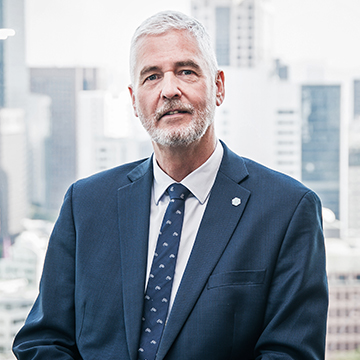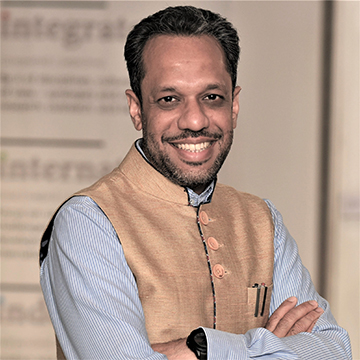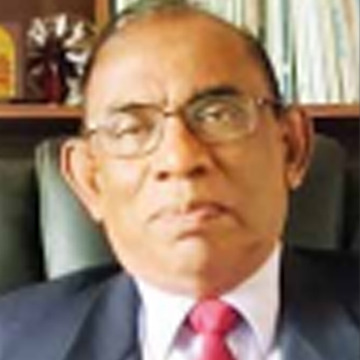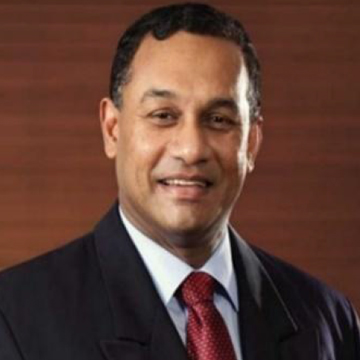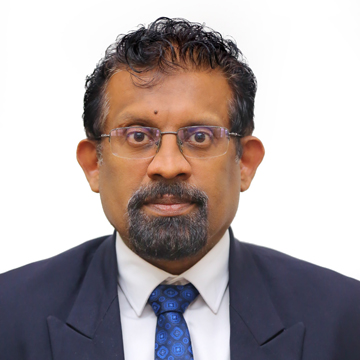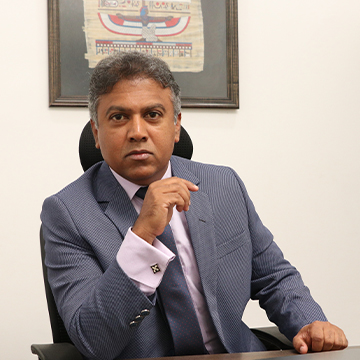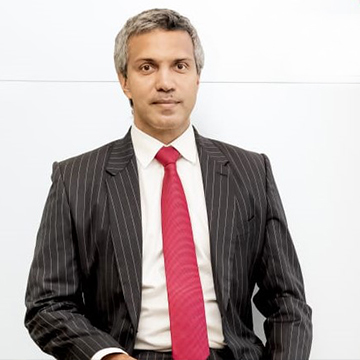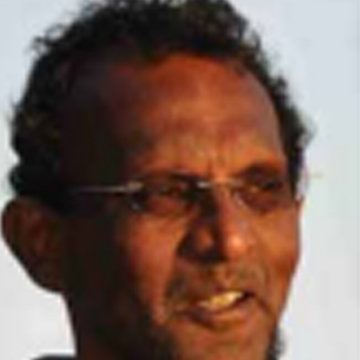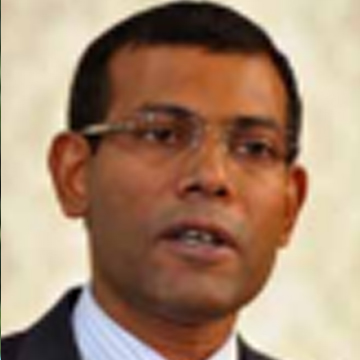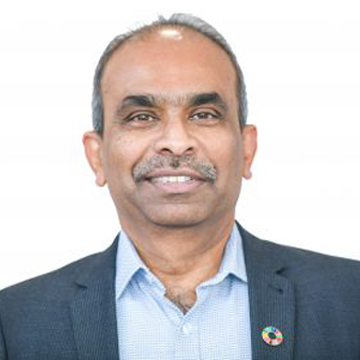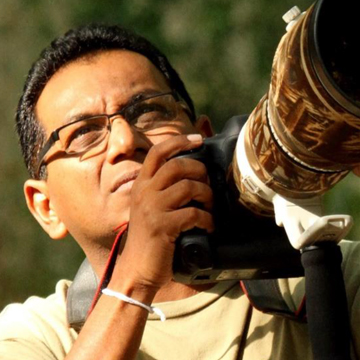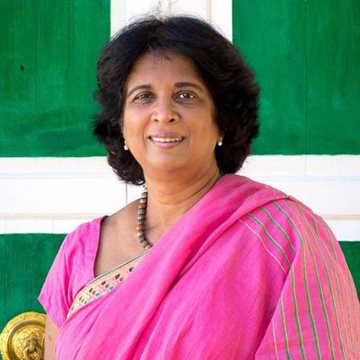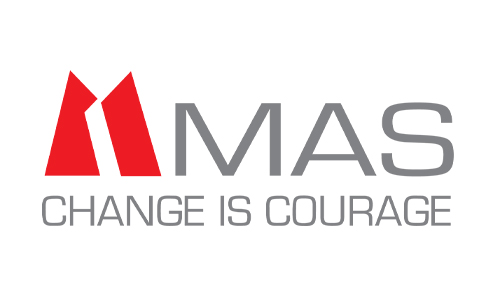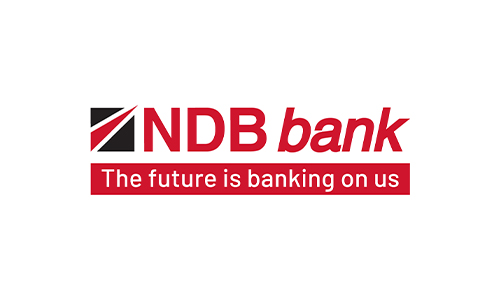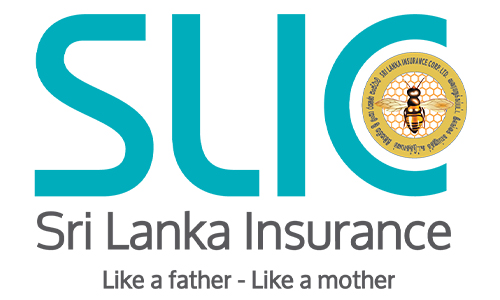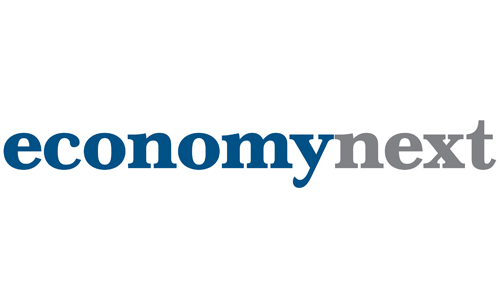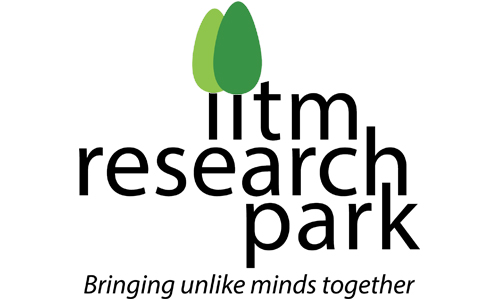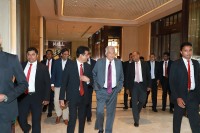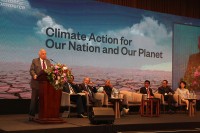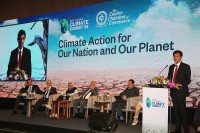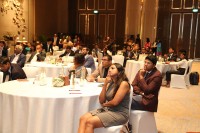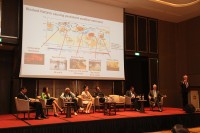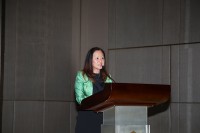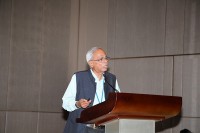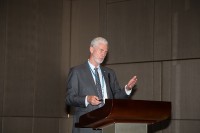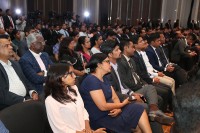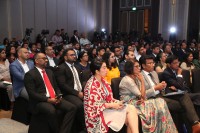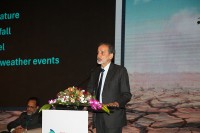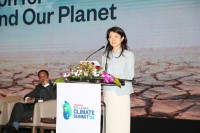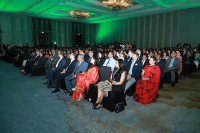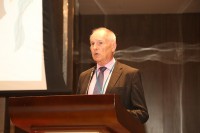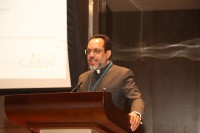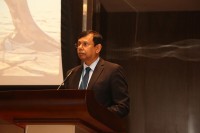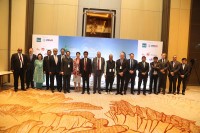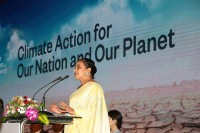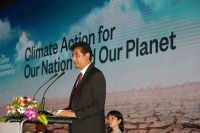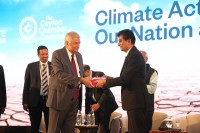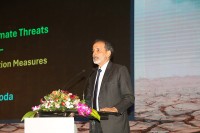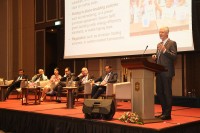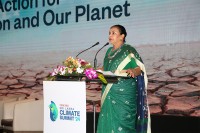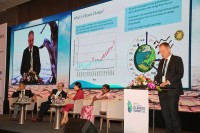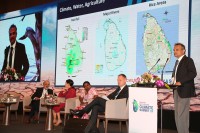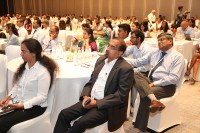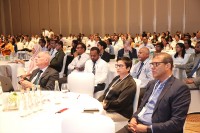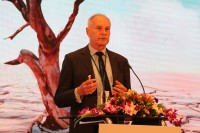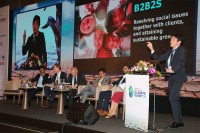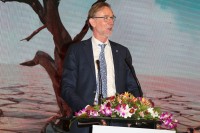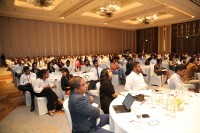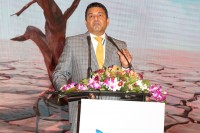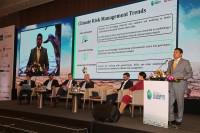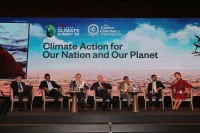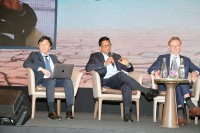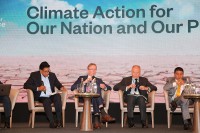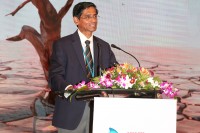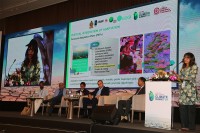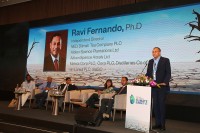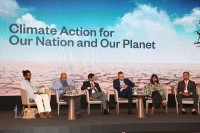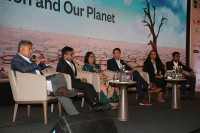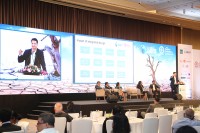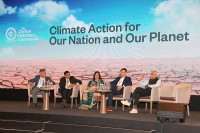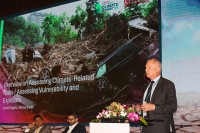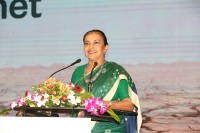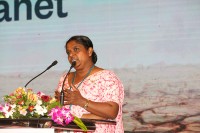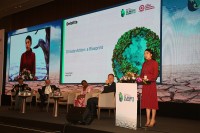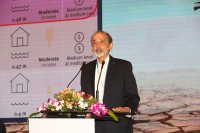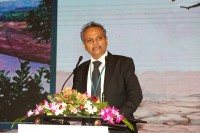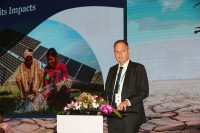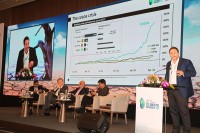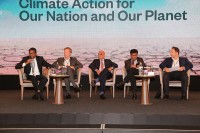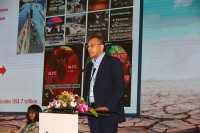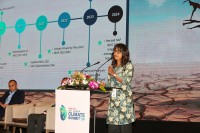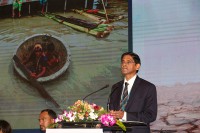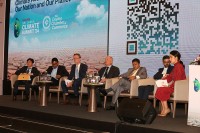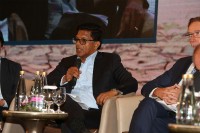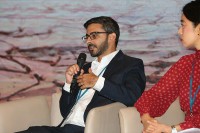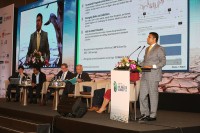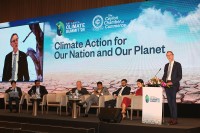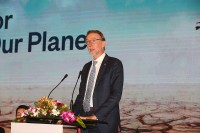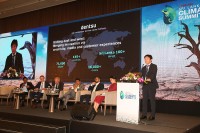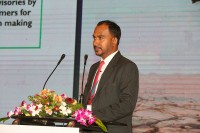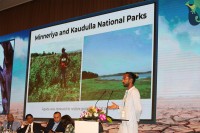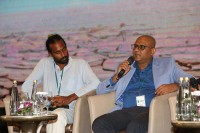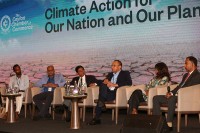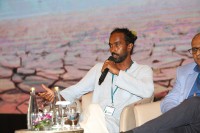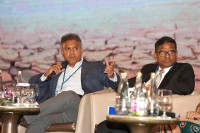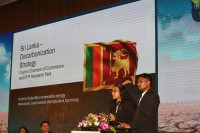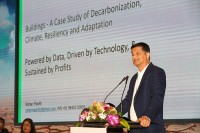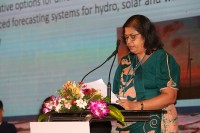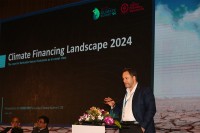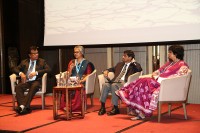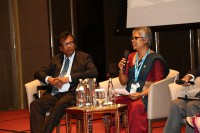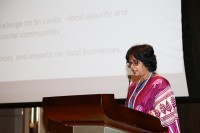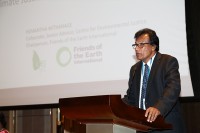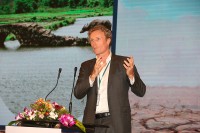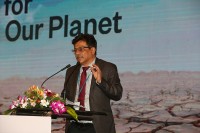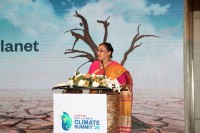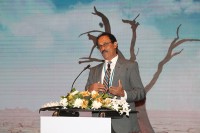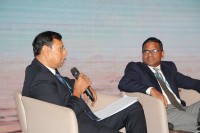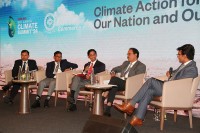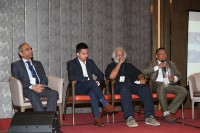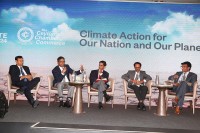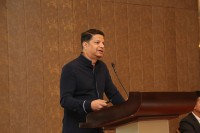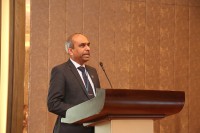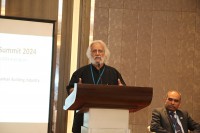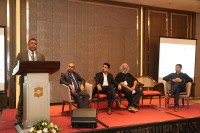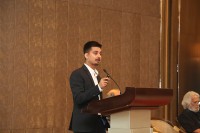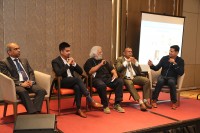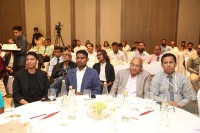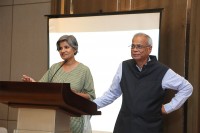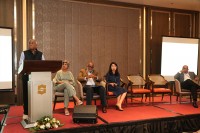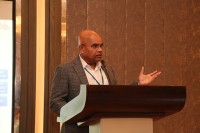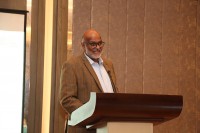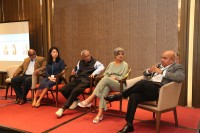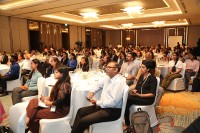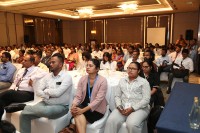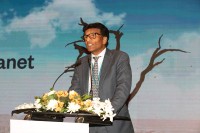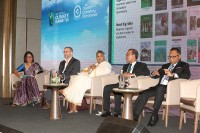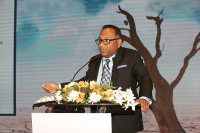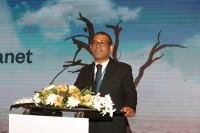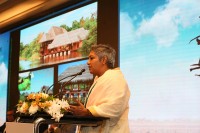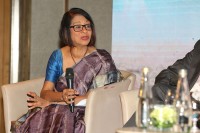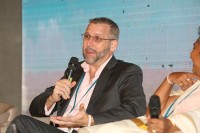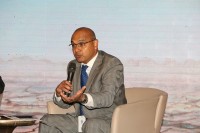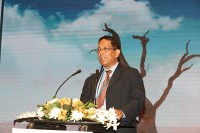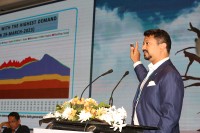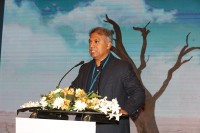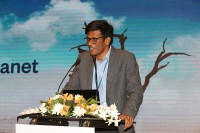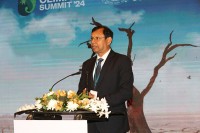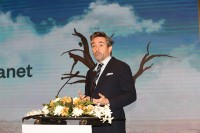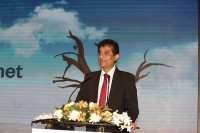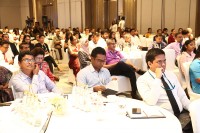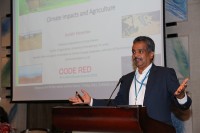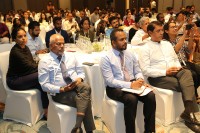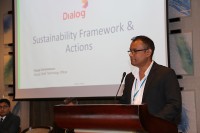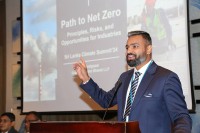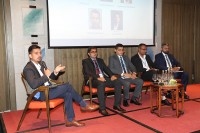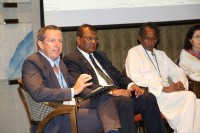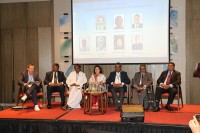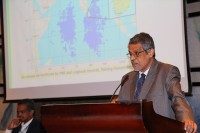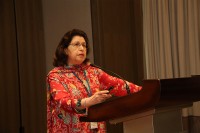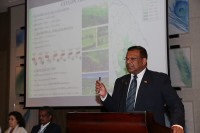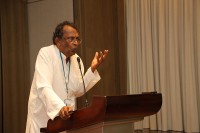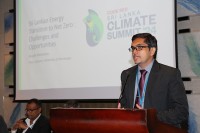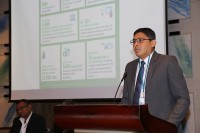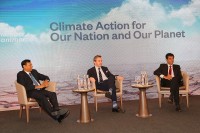Climate Action for our
Nation
and the Planet
7th TO 9th MAY 2024
AT SHANGRI-LA COLOMBO
Sri Lanka Climate Summit 2024
CODE RED
Climate Risks and Opportunities
for Sri Lankan Business
Sri Lanka stands at a critical juncture. The country is recovering from an unprecedented economic crisis given the levels of unsustainable debt, and is currently undertaking a program of economic reforms in agreement with the IMF. The crisis is a unique opportunity to build back better with the strong collective efforts of all including the private sector.
SRILANKA
CLIMATE
SUMMIT 2024
ABOUT SLCS 2024
The Paris agreement’s aspirational target of holding the temperature increase to 1.5 ˚C compared to pre-industrial era, is considered no longer achievable with 2023 registering a 1.45 ˚C increase. The rate of increase of GHG concentration in the atmosphere has not declined, and it would require a global rapid mobilization of resources to stay within the absolute target 2 ˚C increase set by the Paris Agreement.
Sri Lanka is also highly impacted by the Climate Crisis. The scientific consensus – a resounding “Code Red” – warns of accelerating climate change with devastating consequences to human civilization, planetary biosphere and our economies. Left unaddressed, climate crisis will erode large amounts of global GDP and will impact businesses.
ABOUT SLCS 2024
The Paris agreement’s aspirational target of holding the temperature increase to 1.5 ˚C compared to pre-industrial era, is considered no longer achievable with 2023 registering a 1.45 ˚C increase. The rate of increase of GHG concentration in the atmosphere has not declined, and it would require a global rapid mobilization of resources to stay within the absolute target 2 ˚C increase set by the Paris Agreement.
Sri Lanka is also highly impacted by the Climate Crisis. The scientific consensus – a resounding “Code Red” – warns of accelerating climate change with devastating consequences to human civilization, planetary biosphere and our economies. Left unaddressed, climate crisis will erode large amounts of global GDP and will impact businesses.
SRILANKA
CLIMATE
SUMMIT 2024
THEME OF THE SRI LANKA
CLIMATE SUMMIT 2024
The Climate Summit is aimed at developing a deeper understanding of various aspects of the
climate crisis from a global and a Sri Lankan perspective, highlighting the potential disruptions to key economic sectors.
Session 1: CEOs Session (By invitation only)
Understanding Climate Science,
Risks and Opportunities
This invitation only session brings together the country’s leading CEOs and business owners to deepen their understanding on current scientific consensus in climate science, risks and opportunities it presents to business, and actions required to mitigate risks and successfully achieve growth opportunities. The session is both informative and discussion based, and aims to set the path for Sri Lankan businesses to integrate climate action into their business decisions, which will be discussed in greater depth and breadth at the conference.
Presentations: :
(1) Role of Business in a Planet Threatened by Climate Crisis.
(2) Introduction to Climate Crisis.
(3) Implications for Business in Risks and Opportunities.
(4) Opportunities for Green Growth in Sri Lanka.
(5) Making Net Zero Possible and Financially Viable.
(6) Mobilising Funding for Green Growth.
(7) Panel Discussion.
Opening Ceremony
Climate change is a pressing global issue that demands urgent attention from businesses, governments, and societies worldwide. As temperatures rise and weather patterns become increasingly erratic, it’s crucial for organisations to grasp the distinction between climate and weather and recognize the scientific consensus on human-induced climate change. This session is a high-level introduction to some of the themes of the summit and sets the stage for day two, with an opening statement by the President of Sri Lanka and a discussion with local and global specialists.
Presentations:
(1) Sri Lanka Business and Climate action.
(2) Integrating Climate Action into Business.
(3) Global Climate Science & Impacts
(4) Implications for Businesses – Risks and Opportunities.
(5) Climate Change and Sri Lanka (15, 50, 100 years from now).
(6) Current Climate Policy context and Vision for Sri Lanka’s Green & Just Economic Transition.
(7) Panel Discussion: Creating a multi-stakeholder ecosystem or climate led growth.
0900 – 1030 hrs
Session 01: Climate Crisis: Global & Local Impact
Climate Crisis: Global & Local Impact
This session introduces the climate crisis first from a global standpoint exploring the causes and the global impacts from a scientific perspective. It will also explore the possible climate futures that are modelled, what needs to be done to achieve each and the implications of these choices. The session will then focus on the specific impacts faced by Sri Lanka at present and expected in the future, looking at climatic, biodiversity/ecology, communities and infrastructure.
Presentations:
(1) Understanding the Climate Crisis and its Impacts on a Global Scale.
(2) Exploring the Impacts of the Climate Crisis and understanding Sri Lanka’s positionality.
(3) Unveiling Local Impacts of the Climate Crisis – Implications for the Nation, Communities and Ecology.
(4) Panel Discussion: Climate impacts to communities, ecology and human settlements.
Session 02: Risk to Business in a Changing Climate
Risk to Business in a Changing Climate
This session explores the potential risks for business – first from a hydroclimatic perspective, analysing the risks, vulnerability and exposure. Risks and vulnerability of Sri Lanka is also explored based on local studies. Subsequently, the session examines how climate action is shaping the global business environment, looking at implications to trade, tariffs, regulations and fund flows. Special emphasis is placed on the rapidly evolving regulatory frameworks in the EU and the US evolving and how it will shape the global business landscape, and implications for companies doing business with the EU.
Presentations:
(1) Overview on Assessing Climate-Related Risks/ Assessing Vulnerability and Exposure.
(2) Changing Business environment - how climate crisis is shaping the global business Environment (regulation/tariff, investments, trade).
(3) Case studies: Changing Business environment - how climate crisis is shaping the European business enviroment (regulation/tariff, investments, trade).
(4) Risks and Vulnerabilty - Sri Lankan context.
(5) Panel Discussion: Turning Risks into Business Opportunities.
Session 03: Climate Resillence & Adaptation
Climate Resillence & Adaptation
Climate resilience and adaptation is crucial to Sri Lanka which is highly vulnerable to climate change with low community resilience. The session introduces climate resilience and adaptation, looking at the country’s need and regional best practices on resilience. The session then examines the national adaptation policy and adaptation plan and how it is evolving to meet the needs of the future. Finally, it explores how to integrate resilience and adaptation into the business context and examples of grassroot resilience and adaptation strategies.
Presentations:
(1) Building Climate Resilience from the Ground Up.
(2) National Adaptation Policy Evolution in Sri Lanka.
(3) Integrating Resilience into Business and Policy.
(4) Grassroot Resilience Building: Lessons Learned and Tips for Success.
(5) Panel: Challenges and Opportunities in Implementing.
(6) Climate Resilience.
Session 04: Decarbonisation
Decarbonisation
Decarbonisation, the process of reducing or eliminating carbon dioxide emissions from human activities, is a critical component of climate action and presents significant business opportunities. Advancements in technology, costs and materials have opened up capabilities for a rapid energy transition to shift to net-zero energy futures, particularly advantageous for a country like Sri Lanka rich with renewable energy sources. The session begins with an exploration of global energy transition touching on electricity, transportation, industrial and domestic energy needs. The session will also examine the role of buildings within this transition. Lastly, it will tackle the policy frameworks needed for energy transition, along with an overview of the current approach adopted by Sri Lanka
Presentations:
(1) Energy Transition Pathways and Technologies - Electricity, Transportation, Buildings and Thermal.
(2)Buildings - a case study of decarbonisation, climate resilience and adaptation.
(3)Policy Frameworks and Incentives for Decarbonization
(4)Panel Discussion: Decarbonisation Opportunities for Sri Lanka across Sectors
Session 05: Breakout Sessions BR 01 Climate justice & Equity
BR 01 Climate justice & Equity
Climate crisis is expected to further worsen global inequalities – both at nation state level as well as within the nation state. The current climate crisis is driven by historical emissions of the global North, while the much poorer countries in the global South bear a larger brunt of it while not contributing to the problem. The session explores the concepts on climate justice and equity, and the current and emerging challenges and opportunities at a global level including the concept of Loss and Damage.
Presentations:
(1) Keynote Speech: Global Systemic Inequities and the Need for Climate Justice and Equity.
(2) Empowering Communities: Community-Driven Approaches to Climate Justice.
(3) Panel Discussion: Role of Climate Justice and Equity in Climate Conversations.
Session 05: Breakout Sessions BR 02 Climate Financing
BR 02 Climate Financing
Climate action requires significant investment by the state as well as the corporate sector. There is keen interest in sustainable finance, including climate finance, in Sri Lanka. The Central Bank of Sri Lanka (CBSL), has led with several regulatory initiatives in creating the ecosystem for sustainable finance. The session will explore the climate financing landscape, and then look at the specific instruments that are available for the businesses for climate action, with a focus on Asia and global contexts
Presentations:
(1) Overview of the Climate Financing Landscape.
(2) Leveraging Financial Instruments for Climate Action as Business Leaders.
(3) Beyond Debt : The funding decarbonisation with innovative instruments in the fashion industry.
(4) Impact investing for adaptation and resilience in emerging markets in Asia.
(5) Panel Discussion: Climate Finance as Mechanism to Drive Innovation and Impact.
0900 – 1000 hrs
Session 01: Policy and Climate Action
Policy and Climate Action
Enabling policy frameworks are crucial for effective climate action for both state and private sectors. The session will first explore the National climate action policy, strategic plans and action followed by the regional best practices in policy frameworks, and explore the role the business community can/should play in shaping policy to support climate action.
Presentations:
(1) National Climate Action Policy, Strategic Plans and Action.
(2) A Review of Global Climate Action Policy.
(3) Private Sector Engagement in Climate Action Policy.
(4) Panel Discussion: Review of Current National Policy Landscape.
Developing Sri Lanka as a Center of Excellence for Climate Action
Sector/Industry sessions are designed to take a more intimate approach to climate action that are unique to the specific industry. The initial presentations will provide global and local context, and then move into panel and roundtable discussions to set the stage to create local strategic plans that can be executed by the businesses with the support of government and other stakeholders.
BR: 01 Agriculture & Food/Farming Session:
BR: 02 Sustainable Tourism Session:
BR: 03 Construction and Infrastructure Session:
BR: 04 Mobility & Logistics Session:
BR: 05 Energy System Transition:
BR: 06 Industrial Energy – Transition to Net Zero:
Closing Plenary Session1: Commitments and Next Steps
Commitments and Next Steps
The closing plenary serves as the culmination of the discussions, offering an
opportunity to recap the key insights and takeaways that have emerged. This
session aims to bring together the pre event insight gained through the public
interaction interphase, and the deliberations through the conference into a
Climate Action Plan, that is implementable. The session will also include
Presentations:
(1) Present Elements of a Roadmap for Sri Lanka’s Green & Just Economic Transition
WE ARE EXCITED TO ANNOUNCE SOME
OF THE CONFIRMED SPEAKERS
OUR CORPORATE SPONSORS
FREQUENTLY ASKED QUESTIONS
How do I register for the Summit?
Click on the “Register Now” button. This action will take you to the Registration Form.
Fill in the required participant information, including:
- Organization Name
- Title
- Participant’s Name
- Designation
- Contact Details
- Email Address
- Mobile Number
Cost of participation is given below :
- CCC Members – LKR 35,000 – including tax
- Non-Members – LKR 40,000 – including tax
To add multiple participants from your company, please follow these steps:
Click on the “Add Participants” button to include their contact details. Please provide unique Mobile Numbers and Email addresses for each participant, as the registration platform identifies participants by their Mobile Numbers. Note that the same Mobile Number cannot be used for more than one participant.
What do I need to attend the Summit?
In person participants needs to produce the QR Code saved on your mobile phone, i-Pad or a printed copy at the Entrance to the Summit Venue.
How can I ask a Question at the Summit?
Instructions for submitting questions on Day 2 of the Summit will be provided later.
Who do I contact for Questions?
We are glad to assist you, if you need any further clarifications. Please forward us with an E-mail – events@chamber.lk or call us on 011 5588852 or 011 5588882

Unprecedented warming triggers species loss, ecological collapse, and economic chaos.
The Paris Agreement’s 1.5C limit is obsolete. This isn’t a distant threat-it’s our urgent reality.
© 2024 Climate Summit All Rights Reserved. Solution by Lankacom



